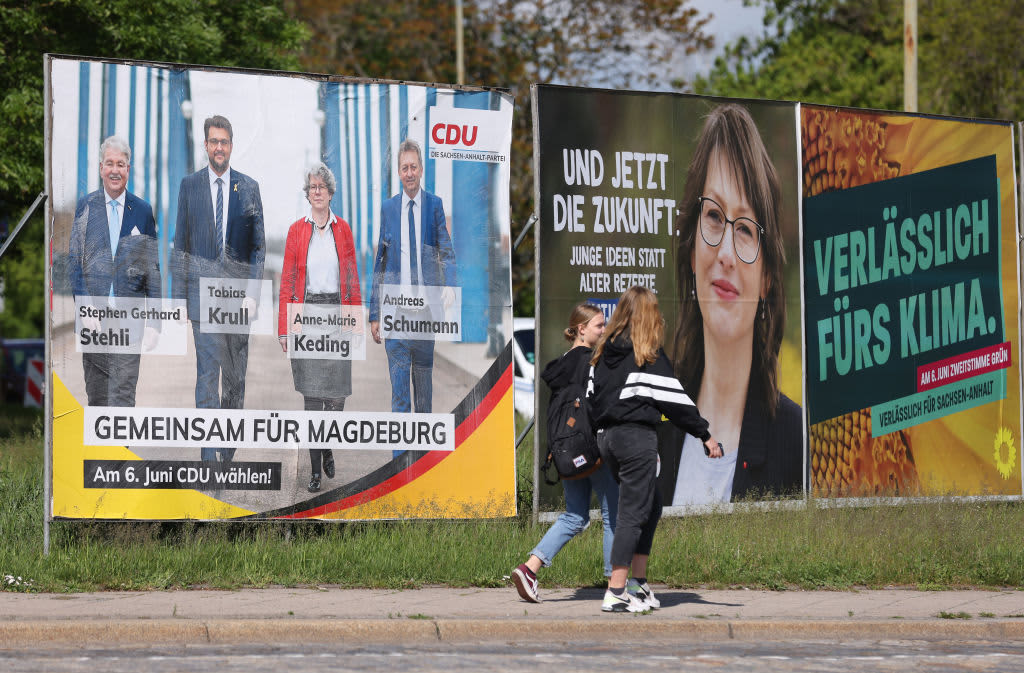Merkel's party wins big in crunch state election as Greens 'hype' fades

People walk past election campaign posters of the German Christian Democrats (CDU), the German Social Democrats (SPD) and the German Greens on May 28, 2021 in Magdeburg, Germany.
Sean Gallup | Getty Images News | Getty Images
Germany's ruling Christian Democratic Union has made something of a political comeback, after a striking win in a regional election on Sunday, according to exit polls. The results are likely to give Chancellor Angela Merkel's party a boost ahead of the federal election in September.
The CDU looks to have retained the eastern state of Saxony Anhalt, surging ahead in the regional vote and staving off a challenge from the far-right Alternative for Germany party.
The win is seen a boost for CDU leader Armin Laschet in what was the final regional vote before the country decides who will replace Merkel on September 26.
Exit polls released by public broadcasters ARD and MDR saw the CDU with 37.1% of the vote ahead of the far-right Alternative for Germany (AfD) which had 20.8% of the vote. Meanwhile the Green Party, which earlier this year saw a national bounce in voter polls, received just 5.9% of the vote putting it in fifth place.
Green 'hype' fading?
The result will be a blow for the Green Party which had been seen as a contender to form a part of — or even lead — a coalition government after September's general election. But analysts now believe the Greens' bounce could now be fading.
"Much of the Green hype that we've seen over the past seven weeks, since they picked Annalena Baerbock as their candidate (for chancellor) has simply been overdone," Holger Schmieding, chief economist at Berenberg, told CNBC Monday.
"There is some natural fascination with the new, but when it really comes down to it and thinking 'who do we really want to lead this country, who do we trust to manage things reasonably well,' then voters stick to what they know," he added.
Schmieding noted that, with the German economy rebounding and the pandemic being managed reasonably well, Germans "don't have a reason to yearn for change." Berenberg Bank maintains that the most likely outcome of the federal election remains a coalition between the CDU and its Bavarian sister party, the Christian Democratic Union (CDU), and the Greens, with the likelihood of this scenario at 60%.
While the regional election in Saxony-Anhalt (a small state of around 2.2 million people) showed little support for the Greens, analysts note that national voter polls still put the Greens in second place to the CDU/CSU alliance. Nonetheless, the party has seen its poll rating decline after a sharp bounce in April and May after the party elected Annalena Baerbock as its candidate for the federal election. Still, Politico's poll of polls puts the CDU/CSU with 25% of the vote come September, and the Greens with 23%.
Winds of change
Given Saxony-Anhalt's small size, and its traditional disaffection with the Green Party, another analyst noted that any extrapolation of the regional results on the national level "should be done with caution."
Carsten Brzeski, global head of Macro at ING, added in a note Monday that the vote serves to "illustrate that, even if there was any, the wind of change in German politics is currently very mild."
"The CDU has recovered from the dip after the nomination of Armin Laschet to lead the party into the elections. Whether it is the accelerating vaccination roll-out or the strong popularity of the CDU minister-president in Saxony-Anhalt, Reiner Haseloff, the fact is that the CDU has gained momentum in recent weeks," he wrote.
Meanwhile, Brzeski noted that "the rise of the Greens has come to a (temporary) halt" after a series of missteps and misfortunes for the Greens.
"After the surge in the polls after the nomination of Annalena Baerbock as official candidate for the chancellery, expenses slip-ups, some vagueness in Baerbock's resume and an affair involving the mayor of the city of Tübingen have hit the electorate's support for the Greens," he said.
"In short, the fact that at the third state election this year, the third incumbent minister-president won the election suggests that there is very little wind of change in German politics. The re-emergence of the CDU and some weakening of the Greens could give credence to this theory."
While analysts note that there is still a long way to go until the elections in September, the latest results show that, as Brzeski noted, "the mood in German politics can shift easier and faster than in the past."
Read More

No comments